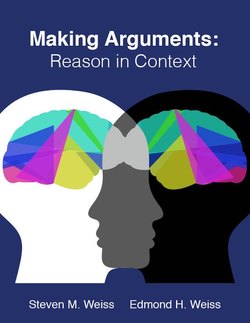Читать книгу Making Arguments: Reason in Context - Edmond H. Weiss - Страница 31
На сайте Литреса книга снята с продажи.
How Judging Philosophies Work
ОглавлениеThe judging philosophies are archetypes or ideals. In practice, no one can evaluate an argument exclusively from one of these judging perspectives. Indeed, any particular instance will almost certainly represent a hybrid of two or more of these judging postures. At college and high school debate tournaments, judges are often asked to write and submit their “judging philosophies.” This allows the debaters to learn about how a given judge might respond. When there are multiple judges in a debate, the debaters may need to employ complicated argumentative strategies to address the diversity of judging viewpoints.
Here are some specific illustrations of how advocates might have to adapt their debating strategies to reflect the expectations of their judges:
Tabula Rasa. The judge knows something of the issue, but needs to be schooled about the severity of the problem. (What exactly is a “stem cell”?) He or she will need to appreciate the compelling nature of the problem, as well as society’s complicity in the problem’s continuation. The judge will want to know what the advocates offer as a remedy for the problem, as well as some good evidence and argument that the proposed remedy can work. At any point in the debate, the judge could decide that he or she does not have substantial proof for a given issue, and decide not to entertain any possibility of change in a direction away from the status quo.
Policymaker. This judge understands the issue, and can even offer guidance for alleviating the confusion associated with the conflict. Indeed, this judge may be more disposed toward negotiation than toward winner-take-all debate competitions. He or she will not assist one side or the other in making decision, but may synthesize an outcome that was not obvious in the presentation of disparate positions.
Critic. The judge’s decision is more idiosyncratic. The likes and dislikes of the judge may influence the decision. Preferences of taste, appropriateness, decorum, and execution greatly vary among judges adopting a critical paradigm. In this case, debaters might have to rethink their vocabulary, the order in which they present arguments, the kinds of data that are most compelling, even their clothing and personal demeanor.
Educator. The educator often imparts a sense of equifinality in a debate, a term from systems theory suggesting that the current point in the argument could have been reached by many means. While a “decision” is reached, the debaters have a lot to learn, and the decision reflects how much improvement can be made.
Theorist. The theorist will look for a principle to vote for. If the advocates can enunciate a principle, it may help them win favor with the judge. If we are debating the Patriot Act, for example, an advocate might argue that safety and security supersede freedom as goals in our society. The judge’s adherence to the principle could help one side to prevail over the other.
Jurist. One must know the rules and guidelines for advocacy and adhere to those requirements that apply to the current context. Procedural rules must be followed. Evidentiary standards must be upheld. Only permissible argumentative behaviors are tolerated. Fairness must be maintained. Neither side in the controversy can have an advantage stemming from violating the rules; nor can the judge can render a decision based on such an unfair advantage. Indeed, the jurist judge may be skeptical toward an entire argument if even a small part of it violates “due process.”
Politician. The judge wants a remedy and will vote for the plan that can be implemented as quickly as possible. The judge is driven by a sense of the urgency of the issue, and debaters should stress the directness with which the urgency can be resolved. Politician judges are particularly skeptical toward proposals that seem to delay or stall action.
Scientist. The judge may ask for evidence, and may expect the advocates to know what the evidence means and how it was gathered. The scientist judge will expect an advocate to answer any indictments of the evidence, and defend it against other studies and counter-evidence. Debaters would be unwise to overstate the certainty in the data and should never appear to be suppressing contrary or inconvenient facts. Scientists are especially wary of false claims of cause-and-effect, especially the reasoning error known as the “false positive.”
